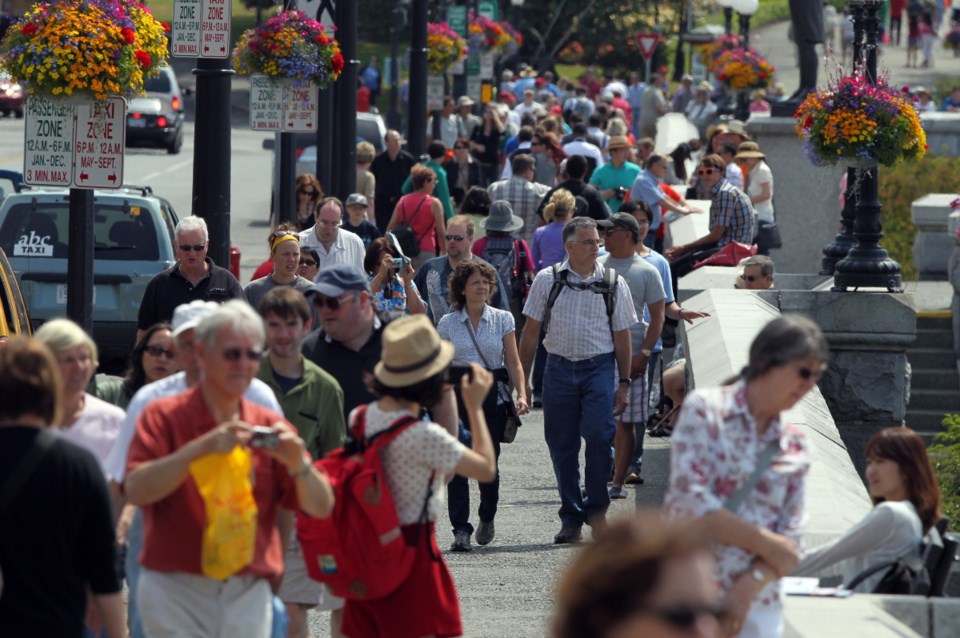B.C.’s tourism and hospitality sector is asking the provincial government for a $680-million stimulus package to help businesses and workers devastated by the pandemic and its crippling travel restrictions.
The Tourism Industry Association of B.C., which represents more than 19,000 businesses, said Tuesday it wants the province to allocate nearly half of its $1.5-billion recovery fund as an initial investment to mitigate the unprecedented impacts of COVID-19 on tourism.
“The existing suite of packages aimed at the overall economy are appreciated, but not sufficient to sustain the B.C. tourism and hospitality sector for the foreseeable future from this unexpected pandemic,” association chair Vivek Sharma said in a statement.
“The only way we can prevent generations of lost economic activity, jobs, and tax revenues is by acting decisively now with innovative and creative solutions that recognize the importance of this sector, which is the face and brand of British Columbia to the world and one of the strongest drivers of B.C.’s economy.”
The industry has been hit hard by business-closure orders, restrictions on personal travel and the closure of international borders. The association said virtually the entire sector was shut down, resulting in extensive layoffs, with many businesses having closed without the cash flow to re-open and thousands more desperately trying to maintain solvency.
Despite the start of Phase 3 reopening on June 24, most sector businesses have only partially re-opened.
Brett Soberg, owner and operator of Eagle Wing Tours in Victoria, said whale watchers are operating in the Salish Sea, but passengers are a “fraction of previous years” because of the U.S. border closure. About 90 per cent of current customers are from B.C., with the remainder from Alberta and Ontario.
Eagle Wing has 21 of its 49 staff members back at work, with the help of government wage programs.
Soberg said he and other tourism operators welcome any sort of relief. “In short, tourism trickles down through the community ... it’s so important to the economy,” he said. “If you live in Victoria, you probably know at least one person who works in the industry.”
The tourism association has a bleak economic outlook. It said the best-case projections will see tourism revenue drop to $6.7 billion in 2020 from from $20.4 billion in 2018. “This severe loss in revenue, which could be significantly greater, will have reverberating impacts on jobs, government revenues through taxes, and the ability to re-invest in the sector for a more resilient, sustainable future,” the association said.
The stimulus package proposed by the tourism and hospitality sector has three components:
A Working Capital Recovery Grant ($475 million) to sustain businesses that could return to profitability in the medium term — 18 months or so. The money could go to low- or no-interest loans with an extended payback period. The immediate priority would be to help businesses that normally rely on out-of-province visitors, as well as businesses that play central roles in attracting visitors to a community or a region.
Support for Adaptation Costs ($190 million) to help businesses meet COVID-19 health and safety requirements, and help them deliver tourism experiences in a way that accelerates recovery.
Support for Developing Resilient, B.C.-focused Supply Chains ($15 million). The goal would be to support industry subsectors (accommodation, attractions, transportation, food services, and retail) forge new relationships with B.C. suppliers in a way that accelerates recovery.
The proposal also recommends a joint industry-government task force to work alongside existing industry organizations to implement and monitor the measures.
“For decades, tourism has been a strong and consistent economic engine for the province and significant source of employment in every B.C. community,” said Sharma. “What we are asking for is a return on the contributions the tourism and hospitality sector has made to the provincial and national economy over those decades. Essentially, we need an initial investment of $680 million to save an industry that is worth more than $20 billion per year.
“Without this support, our sector could see upwards of 100,000 jobs lost in 2020 and thousands of businesses permanently shuttered.”
> To see the proposed tourism and hospitality sector recovery stimulus proposal, go online to
- - -
TOURISM AND HOSPITALITY IN B.C.
Sector value (2018)
Industry revenue: $20.4 billion
Number of businesses: 19,300 (90 per cent are small- or medium-sized )
Provincial GDP: $8.3 billion
Tax revenue for government: $4.5 billion in direct tax revenues ($1.7 billion provincial)
Direct employment: 160,000 people (third largest private sector employer in B.C.)
Impact of COVID-19: Ten per cent of independent restaurants have closed permanently and 50 per cent expect to close permanently by the end of the year without assistance.
Hotel occupancy was down 62 per cent June over June and many hotels are not yet open.
One-quarter of businesses in all regions are closed and more than half are experiencing reduced operations.
More than 100,000 full- and part-time tourism and hospitality jobs have been temporarily or permanently lost.
Many major attractions are seeing less than 10 per cent of normal revenues.
Most lodges on the coast will not open this year at all, and many guest ranches in the Interior do not have any visitors and cannot operate.
Major tour bus companies have been idle for months and some are only operating again with very limited capacity and not seeing sufficient volumes to survive.
The cruise-ship sector has been docked for the foreseeable future.
Major tour operators such as the Rocky Mountaineer train are not operating.
Without international clients, many angling guides and hunting guides are not operating.
Eighty per cent of commercial bear-viewing operators will not open this year.
The entire meetings, festivals and events sector has ground to a halt.
Some major hotels remain closed. Those open in major centres like 91ԭ��, Richmond and Victoria are experiencing limited occupancy — in many instances less than 20 per cent.
In Victoria, accommodation revenue numbers declined 86 per cent in June after declines of 90 per cent in both April and May.



